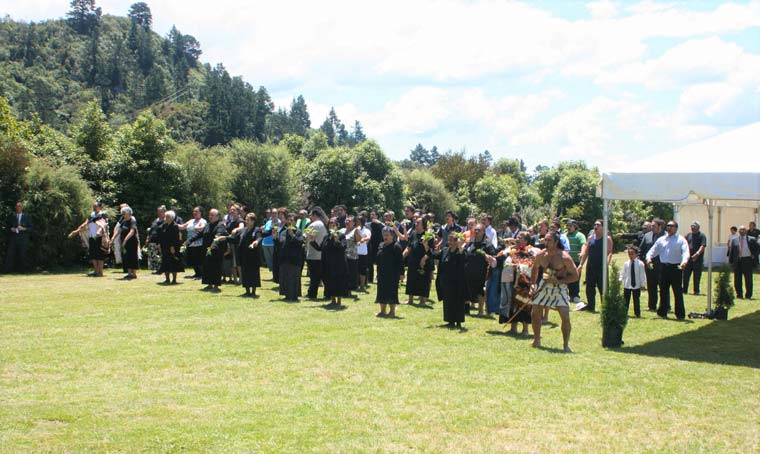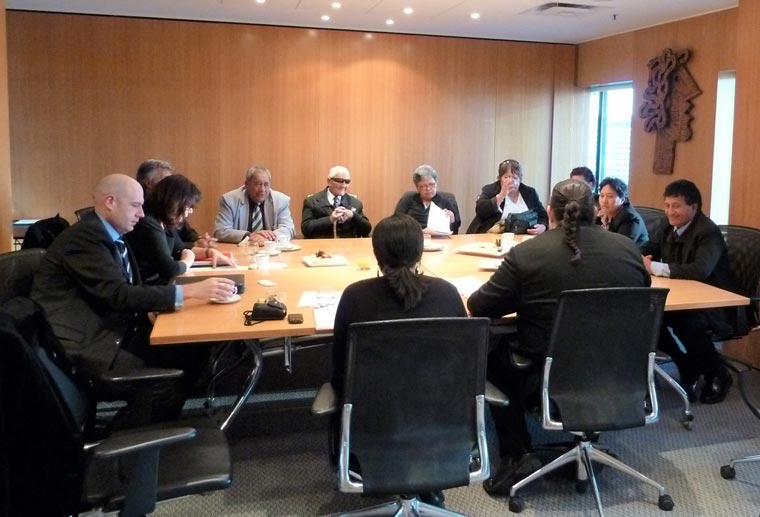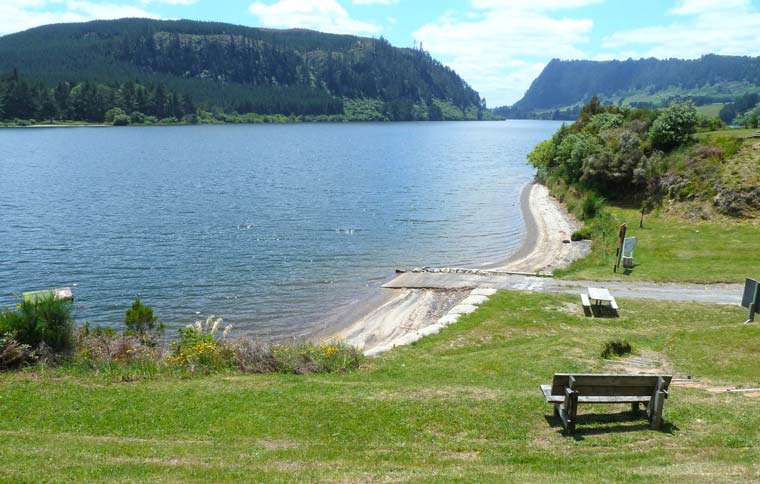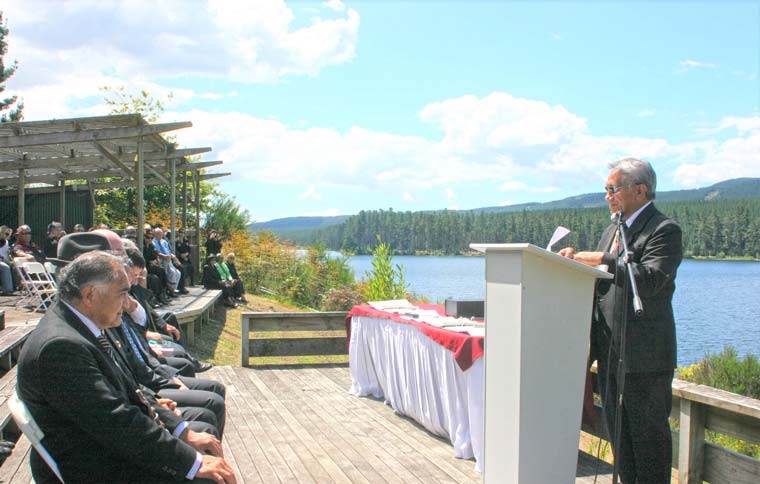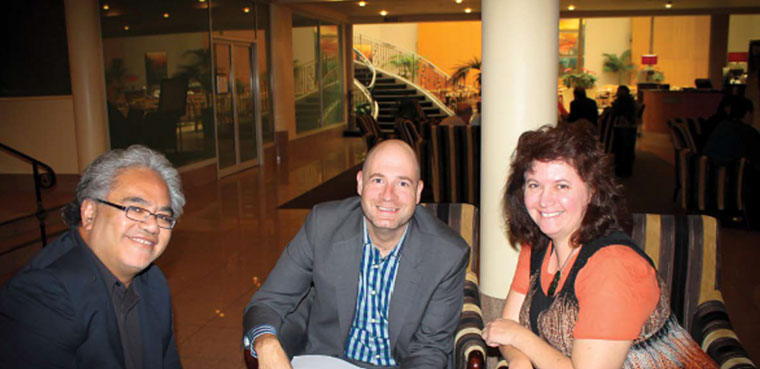In September 2010, Minister Chris Finlayson and his colleague, local member of Parliament, Louise Upston attended the Te Puāwaitanga-o-Raukawa, Raukawa Reconciliation Day. The day was an opportunity for Raukawa uri to present their kōrero around the effects of the Crown’s breaches upon themselves and the iwi. On that occasion the minister was invited to simply listen to the stories.
It was a powerful tool used by the iwi to put a face to the stories. It provided opportunity for the Minister to appreciate the sense of hurt felt by the iwi. The stories expressed that day were compelling and highlighted Raukawa grievances. No one present left untouched by the enormity of each of the stories told.
Video transcript
Chris McKenzie:
‘So we had to think about what else we could do. We liked the idea of the Truth and Reconciliation Hearings that took place in South Africa. Where communities were terrorised by individuals. Black communities were terrorised by individuals. Judges and the Court went from community to community and they could bring the perpetrators of those crimes in front of them and they could tell those people how it made them feel.
That person who perpetrated the crimes could then talk as well and if appropriate, appropriate apologies would be made. What they found during those Truth and Reconciliation Hearings is that Police Chiefs who had raped, beaten, murdered and tortured in their communities, stood up and answered for their crimes. People met these people and understood what drove them. They could see they were truly remorseful and communities accepted the apologies.
So we thought we would run that ourselves. It was a moving day, a number of Ministers came respectfully... and the Prime Minister, and respectfully sat and listened while claimant after claimant got up and spoke about how they were carrying claims on behalf of their mother or their grandmother and they spoke indepth about their specific family circumstance and the family claim.
One of the claimants was my wife and she was there on behalf of her mother, who was a claimant. Her mother having died 2 or 3 days before the Truth and Reconciliation. I said to my wife, as a claimant in a professional capacity “I’m not sure that, you know, you are going through a very emotional time. Your mother has just passed away and I’m not sure you might want to stand.” She was adamant. “No I’m going to do this on behalf of my mother.”
I was concerned, but this is exactly what this forum is about. It’s about claimants bringing the claims. Having their own safe space to talk. So my wife stood up. I read her prepared speech, it was good. It spoke about a couple of generations of loss of language which was important to her. Them being disengaged and having to move away from our area because we had no tribal lands. Not knowing her own family and so, when she got up to speak I thought she was going to make some good points.
As soon as she stood, she broke down and cried. She stared at the Ministers and screamed “You murdered my mother! You didn’t do it, but I know you murdered her. That many of the issues that she grappled with in her later life was exacerbated by the policies that you represent, by the lost opportunity that she had, by your successive governments policies in the way that you treated our people.”
She didn’t say that elloquently. She used quite a few more swear words than I’m using now. It was raw and emotional and took people by surprise. That was the context for the day. People spoke about it.
We had one of our nannies, Nanny Kahu, who was, I don’t know how old she was, nearly 90, you know, who was moved from place to place when she was young. Who didn’t suffer historic Native Land Court loss, she suffered direct Crown action Public Works Act, use the Public Works to strip them of their land. She knew first hand what it felt like because one minute she’s living on the tribal estate as a young girl and next minute they had nowhere to live. She talked about how she lived in Taupō and how for the first time a guy would come over every fortnight and ask for something called rent and wanted money which they didn’t have because they never had a job.
Ministers had never, I don’t think engaged firsthand with people who were actually impacted. We talked about a range of things. I know that it had an impact upon the Ministers. I know because when it came their turn to respond, nobody really wanted to say anything. I think they’d prepared a speech to say, but I think they realised it would be inappropriate given the level of emotion. So they said “Can we have some time to think about that and we may have to do this again.”
Nigel Te Hiko:
‘Nanny Kahu, Aunty Kahu talked about this at our Reconciliation Day. We had a Reconciliation Day with Minister Finlayson and Louise Upston at the time. We invited the Crown to come and hear the stories of our people, here in Tokoroa.
The Minister showed up and after the pōwhiri, we got our claimants to get up and tell their stories and Nanny Kahu told that story. It had us in tears, not the staged tears that you often see happening, it was real tears because it was a real story.
The Minister didn’t know what to do at this Reconciliation Day. We were all uncertain about what it would look like, but one thing that we wanted him to do and that was just to sit there and just to listen. Don’t say anything. Just listen to us, because it was all about giving our people a chance to say what they needed to say. When Nanny Kahu told that story, it was probably one of the most powerful stories I have ever heard.
It was made even more powerful when she said in her final comment that for her the story of what happened to her parents is a mamae that will always be remembered but need not necessarily be carried. It is a mamae that we need to heal from and that should end with her generation so that the future generations need not carry that sort of mamae forward.
That was just courageous for me. I don’t know whether I would have the fortitude or the manaaki to be able to move forward after something like that. I don’t know whether I could do that. But the courage that she showed, that day was the courage that flowed on to when we signed our Deed of Settlement.
It was Nanny Kahu that accepted the apology from the Crown on behalf of the iwi. It was her inspiration that gave us the courage to accept the Crown’s apology.’
